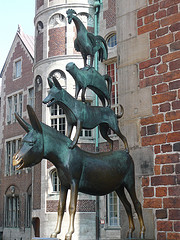By robin | December 14, 2011
Welcome to this very special IASSIST Quarterly issue. We now present volume 34 (3 & 4) of 2010 and volume 35 (1 & 2) of 2011. Normally we have about three papers in a single issue. In this super-mega-special issue we have fourteen papers from the countries: Finland, Ireland, United Kingdom, Austria, Czech Republic, Denmark, Germany, Norway, Slovenia, Belarus, Hungary, Lithuania, Poland and Switzerland. This will be known in IASSIST as the “The book of the Bremen Workshop”.

Town musicians of bremen by Mitko Denev on flickr.
The workshop took place in April 2009 at the University of Bremen. The workshop was hosted by the Archive for Life Course Research at Bremen and funded by the Timescapes Initiative with support from CESSDA. The background and context of the workshop as well as short introductions to the many papers are found in the Editorial Introduction by the guest editors Bren Neale and Libby Bishop. The many papers are the result of the effort of numerous authors that were instrumental in the development and fulfillment of the many outcomes of the workshop. The introduction by the guest editors shows impressive lists of short-term activities, agreed goals, and also strategies for development. There are future initiatives and the future looks bright and interesting.The focus of the Bremen Workshop is on “qualitative (Q) and qualitative longitudinal (QL) research and resources across Europe”. I would have called that a qualitative workshop but you can see from the introduction and the papers that this subject is often referred to as “qualitative and QL data”. The “and QL” emphasizes that the longitudinal aspect is the special and important issue. In the beginning of IASSIST data was equivalent to quantitative data. However, digital archives found in the next wave that the qualitative data also with great value were made available for secondary research. The aspect of “longitudinal” further accentuates that value creation.
This is a growing subject area. During the processing one of the authors wanted to update her paper and asked for us to replace the sentence “80 archived qualitative datasets and yearly around 30-40 datasets are ordered for re-use” with “115 archived qualitative datasets and yearly around 50-60 datasets are ordered for re-use”. Yes, we do have a somewhat long processing time but this is still a very fast growth rate. I want to thank Libby Bishop for not being annoyed when I persistently reminded her of the IQ special issues. I’m sure the guest editors with similar persistency contacted the authors. It was worth it.
As in Sherlock Holmes we might look for what is not there as when curiosity is raised by the fact that “the dog did not bark”. IASSIST has had and continues to have a majority of its membership in North America so it is also remarkable that we here present the initiative on “qualitative (Q) and qualitative longitudinal (QL) research” with a European angle. Hopefully the rest of the world will enjoy these papers and there will probably be more papers both from Europe but also from the others regions covered by the IASSIST members.
Articles for the IQ are always very welcome. They can be papers from IASSIST conferences or other conferences and workshops, from local presentations or papers especially written for the IQ. If you don’t have anything to offer right now, then please prepare yourself for the next IASSIST conference and start planning for participation in a session there. Chairing a conference session with the purpose of aggregating and integrating papers for a special issue IQ is much appreciated as the information in the form of an IQ issue reaches many more people than the session participants and will be readily available on the IASSIST website at https://www.iassistdata.org.
Authors are very welcome to take a look at the description for layout and sending papers to the IQ: https://www.iassistquarterly.com/index.php/iassist/about/submissions. Authors can also contact me via e-mail: kbr@sam.sdu.dk. Should you be interested in compiling a special issue for the IQ as guest editor (editors) I will also delighted to hear from you.
Karsten Boye Rasmussen Editor August 2011

